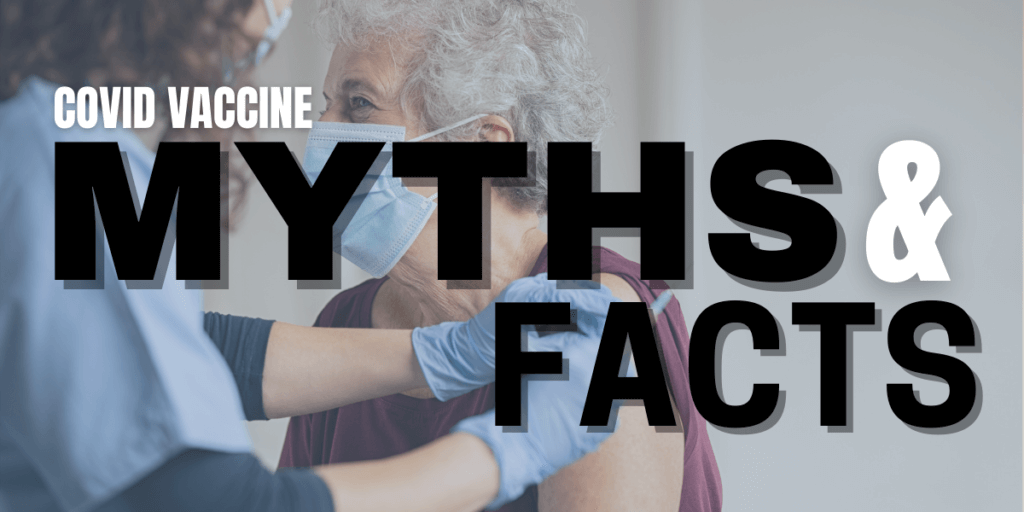
Now that there are authorized and recommended COVID-19 vaccines in the United States, accurate vaccine information is critical and can help stop common myths and rumors. But how do we know which COVID-19 vaccine information is accurate? It can be challenging to know which sources of information you can trust. Before considering vaccine information on the Internet, check that the information comes from a credible source and is updated regularly.
Here at CCP, we want you to know what’s true. That’s why we are sharing the common myths and facts about COVID-19 vaccines released by the CDC.
Can receiving a COVID-19 vaccine cause you to be magnetic?
No. Receiving a COVID-19 vaccine will not make you magnetic, including at the vaccination site, which is usually your arm. COVID-19 vaccines do not contain ingredients that can produce an electromagnetic field at the site of your injection. All COVID-19 vaccines are free from metals such as iron, nickel, cobalt, lithium, and rare earth alloys, as well as any manufactured products such as microelectronics, electrodes, carbon nanotubes, and nanowire semiconductors. In addition, the typical dose for a COVID-19 vaccine is less than a milliliter, which is not enough to allow magnets to be attracted to your vaccination site even if the vaccine was filled with a magnetic metal.
Do any of the COVID-19 vaccines authorized for use in the United States shed or release any of their components?
No. Vaccine shedding is the term used to describe the release or discharge of any of the vaccine components in or outside of the body. Vaccine shedding can only occur when a vaccine contains a weakened version of the virus. None of the vaccines authorized for use in the United States contain a live virus. The mRNA and viral vector vaccines are the two types of currently authorized COVID-19 vaccines available.
Is it safe for me to get a COVID-19 vaccine if I would like to have a baby one day?
Yes. If you are trying to become pregnant now or want to get pregnant in the future, you may get a COVID-19 vaccine when one is available to you. There is currently no evidence that COVID-19 vaccination causes any problems with pregnancy, including the development of the placenta. In addition, there is no evidence that fertility problems are a side effect of any vaccine, including COVID-19 vaccines. Like all vaccines, scientists are studying COVID-19 vaccines carefully for side effects now and will continue to study them for many years.
Will a COVID-19 vaccine alter my DNA?
No. COVID-19 vaccines do not change or interact with your DNA in any way. There are currently two types of COVID-19 vaccines that have been authorized and recommended for use in the United States: messenger RNA (mRNA) vaccines and a viral vector vaccine. Both mRNA and viral vector COVID-19 vaccines deliver instructions (genetic material) to our cells to start building protection against the virus that causes COVID-19. However, the material never enters the nucleus of the cell, which is where our DNA is kept. This means the genetic material in the vaccines cannot affect or interact with our DNA in any way. All COVID-19 vaccines work with the body’s natural defenses to safely develop immunity to disease.
After getting a COVID-19 vaccine, will I test positive for COVID-19 on a viral test?
No. None of the authorized and recommended COVID-19 vaccines cause you to test positive on viral tests, which are used to see if you have a current infection.? Neither can any of the COVID-19 vaccines currently in clinical trials in the United States.? If your body develops an immune response to vaccination, which is the goal, you may test positive on some antibody tests. Antibody tests indicate you had a previous infection and that you may have some level of protection against the virus. Experts are currently looking at how COVID-19 vaccination may affect antibody testing results.
Can a COVID-19 vaccine make me sick with COVID-19?
No. None of the authorized and recommended COVID-19 vaccines or COVID-19 vaccines currently in development in the United States contain the live virus that causes COVID-19. This means that a COVID-19 vaccine cannot make you sick with COVID-19. COVID-19 vaccines teach our immune systems how to recognize and fight the virus that causes COVID-19. Sometimes this process can cause symptoms, such as fever. These symptoms are normal and are signs that the body is building protection against the virus that causes COVID-19. It typically takes a few weeks for the body to build immunity (protection against the virus that causes COVID-19) after vaccination. That means it’s possible a person could be infected with the virus that causes COVID-19 just before or just after vaccination and still get sick. This is because the vaccine has not had enough time to provide protection.
Can being near someone who received a COVID-19 vaccine affect my menstrual cycle?
No. Your menstrual cycle cannot be affected by being near someone who received a COVID-19 vaccine. Many things can affect menstrual cycles, including stress, changes in your schedule, problems with sleep, and changes in diet or exercise. Infections may also affect menstrual cycles.
Source
https://www.cdc.gov/coronavirus/2019-ncov/vaccines/facts.html
